“Anioły w Ameryce, czyli demony w Polsce” – dir. Michał Telega – BARAKAH Theatre in Kraków
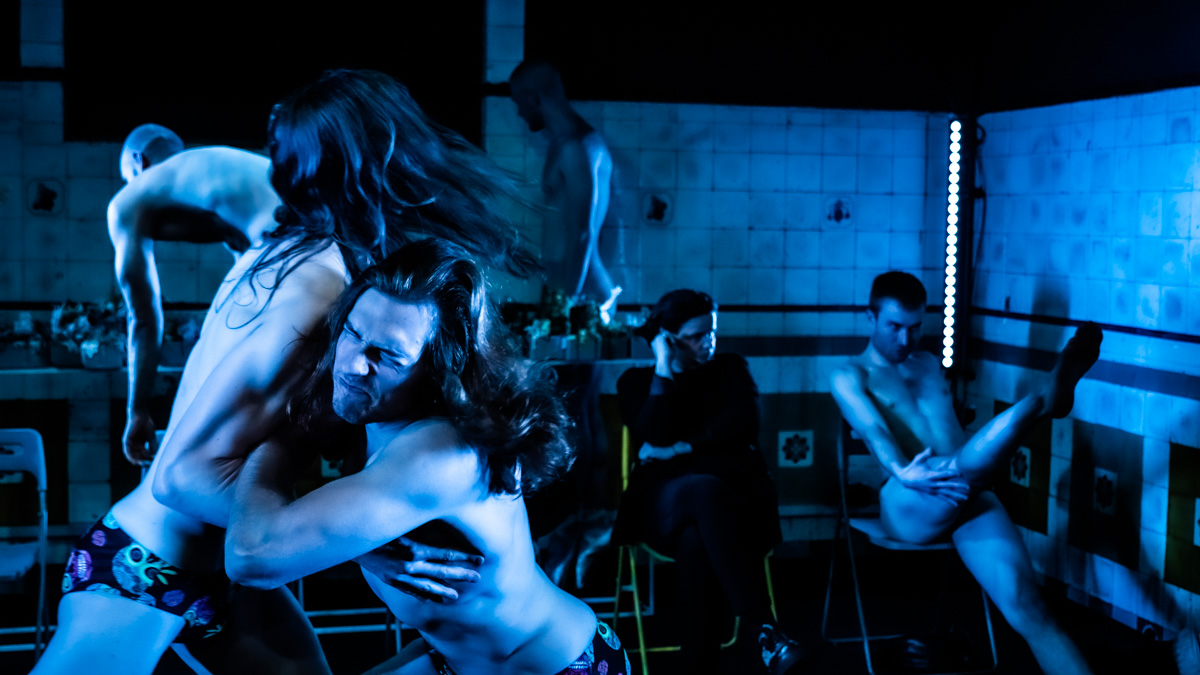
The starting point for the performance is the well-known drama entitled Angels in America. However, it is only a piece of inspiration that pushed the artists to create a story that happens here and now in 21st-century Poland. Anioły w Ameryce, czyli demony w Polsce is a documentary drama.
The author of the script, Michał Telega, invited artists at various stages of their artistic path, mainly those who are just starting their journey. They grapple with the everyday realities of places they came from, they grew up in and which they left in search of their dreams. Telega’s script is based on hours of conversations with them and among them, our conversations, in which the artists confront their own experiences, which are full of emotions that can both destroy as well as relax you.
Cast into an angelic structure, the personal experiences of the artists are stories of hiding, coming out of the closet, more or less spectacular coming outs, personal and contemporary stories. These are our stories that have been documented, but anyone will see themselves in them, even you! Because everyone has something to hide, something they are afraid to let out of the closet in front of society.

author: Michał Telega
direction: Michał Telega
music: Piotr Korzeniak
choreography: Piotr Mateusz Wach
cast: Wojciech Kałuża, Michał Kłodnicki, Monika Kufel, Ana Nowicka, Marek Szajnar, Łukasz Szleszyński, Dawid Tas
premiere: 7 May 2022
running time: 90 minutes
Michał Telega
A theatre director (born 1996), playwright and graduate of the Stanisław Wyspiański Academy of Theatre Arts in Kraków. His major directorial work includes: Książę niezłomny by Juliusz Słowacki (Teatr Współczesny in Szczecin, premiering at the Nowe Epifanie 2020 festival and featured in the 7th edition of the Competition for Staging Old Polish Literature – Klasyka Żywa), Anioły w Ameryce, czyli demony w Polsce (his own text inspired by the drama Angels in America by Tony Kushner; Barakah Theatre in Kraków; the first premiere in May 2022), Kuszenie świętego Antoniego by Włodzimierz Szturc (produced at Teatr AST, presented at the Young Directing Forum in 2018 and at the International Theatre Festival at the Na Strastnom Theatre Centre in Moscow), Aktorki, czyli przepraszam, że dotykam, his original text and show (featured in the Polish Theatre Journal in 2019 and read at Teatr Ochoty in Warsaw during the Zmiana – teraz International Conference, organized by the A. Zelwerowicz Theatre Academy in Warsaw, and at Teatr AST during the Young Directing Forum 2019). His graduation show at the AMA Film School (based on his own text) was directed by Magdalena Łazarkiewicz; the film was broadcast by TVN Fabuła in May 2021. The piece was featured in the Polish drama anthology Revolutii. Antologie de teatru contemporan polonez edited by Katarzyna Niedurny; directed by Mihai Păcurar at the Goethe Institut in Bucharest in June 2022.

The text Aktorki…, lending voice to women of the Stanisław Wyspiański Academy of Theatre Arts, made it to the semi-finals of the Gdynia Drama Award in 2020 and triggered institutional changes in anti-violence policy of that academy; a performance Wykład profesora Mmaa by Stefan Themerson (at the Mazovia Institute of Culture in Warsaw, November 2019); a performative reading of Polowanie by Ishbel Szatrawska (at Teatr Nowy in Poznań, April 2022), Siedem wierszy based on the poetry of S. Beckett (the International Theatre Laboratory entitled “Beckett and The Virtual,“ 2021). A playwright behind the show Grupa warszawska (at the Nowy Teatr in Warsaw, 2020), a playwright and script author for Buntownik, czyli rzecz o narodzie (based on the motifs of Król Duch by Juliusz Słowacki, first premiering at Teatr Lubuski in Zielona Góra, 2022).
He has also worked as an assistant director with Ewa Kaim on Wyspiański. Koncert based on the texts by Stanisław Wyspiański (Juliusz Słowacki Theatre in Kraków, 2018) and Anna Augustynowicz on Zemsta by Aleksander Fredro (Juliusz Słowacki Theatre in Kraków, 2017).
“Serce” – dir. Wiktor Bagińsk – TR Warszawa

In 1994, a nearly 30-year-old Nigerian man living in Poland abandons his newly born child. Thirty years later, his son begins a journey into the heart of his own story. What is the truth and what is the myth in this family story? How to confront racial stereotypes? How to free oneself from hatred? Serce is a documentary story of a young black Polish man who sets out to find his biological father.
Inspired by a short story by Joseph Conrad, the script is based on Victor Bagiński’s autobiographical writing, and is an attempt to highlight the political meanings hidden in the director’s personal history. The director: „My tragedy is not that I am black. My tragedy is not even that I am a black Pole. The tragedy I fear most – following James Baldwin – is the acceptance of the theology that denies me life. This is about yourself allowing the possibility that you might be a subhuman. If you allow such a possibility, or simply a thought, then the struggle for your humanity begins. This performance abandons discourse in favor of experience. Experiences of loss and rejection, which have caused suffering. However, the very search for the moment hatred is born is an occasion for a carefree affirmation of the ABSENCE. The absence of a father.”
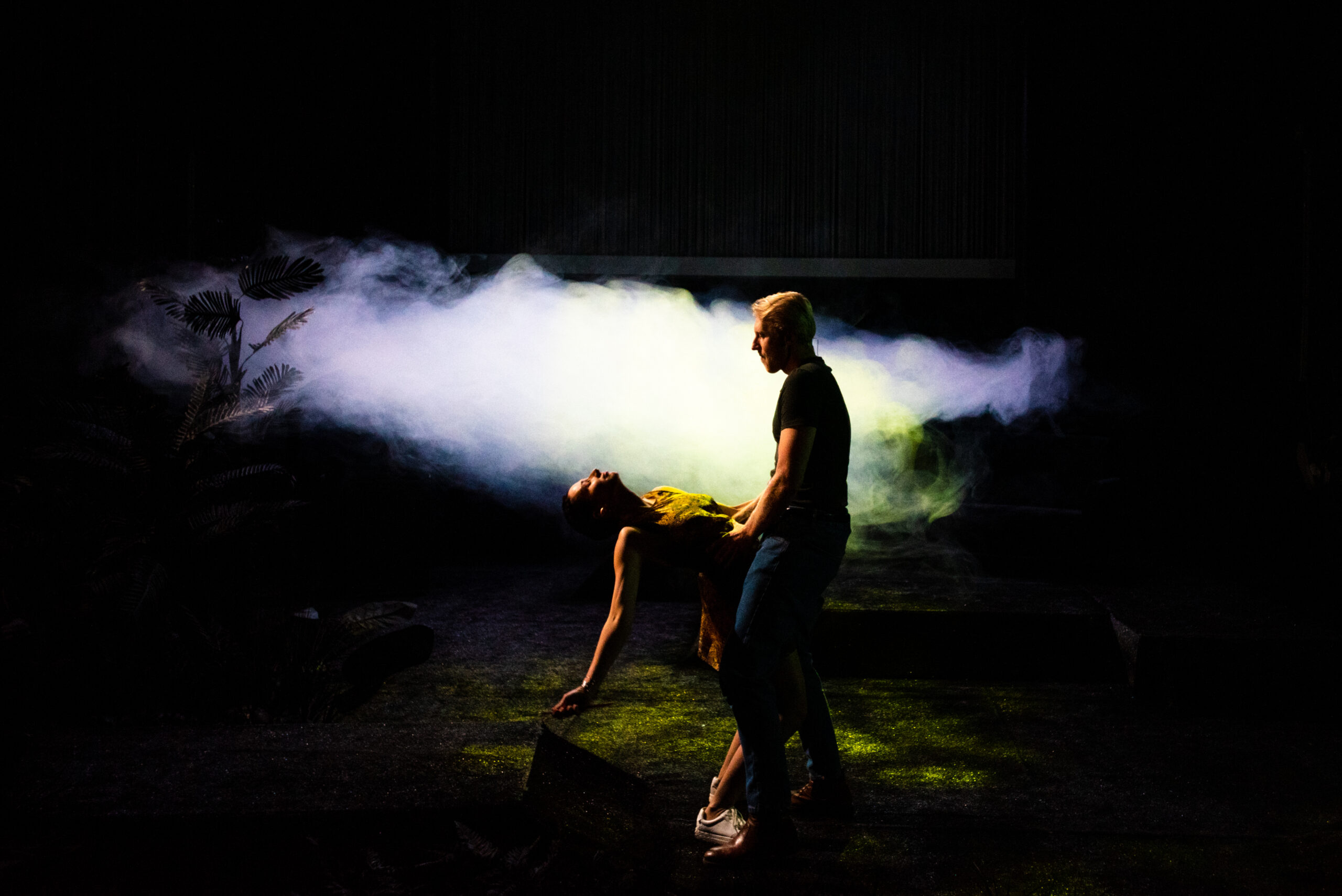
adaptation and direction: Wiktor Bagiński
script: Wiktor Bagiński, Martyna Wawrzyniak
set design: Ania Oramus
costumes: Marcin Kosakowski
light, video: Natan Berkowicz
music: Bartek Prosuł
choreography: Krystyna Lama Szydłowska
assistant director: Wojciech Sobolewski
stage manager: Piotr Piotrowicz
production manager: Magda Igielska
production cooperation: Maria Herbich
cast: Jan Dravnel, Dobromir Dymecki, Magdalena Kuta, Aleksandra Popławska, Wiktor Bagiński (na wideo)
The play uses excerpts from the books:
Joseph Conrad, Heart of Darkness, translated by Aniela Zagorska, Wolne Lektury
James Baldwin, Notes of a Native Son, translated by Mikołaj Denderski, Karakter 2019
Stanislav Grof, Kosmiczna gra, Okultura, translated by Maciej Lorenc, Dariusz Misiuna, Warsaw 2014
Frantz Fanon, Black Skin, White Masks, translated by Urszula Kropiwiec, Karakter 2020
Association of Poles of African Descent, “Z Wiktorem Bagińskim rozmawia Oskar Kafel (prezes SPPA)“ [in:] Rasizm po polsku, HOW2 Digital Publishing
05 March 2021
running time: about 2 hours
Wiktor Bagiński
is a graduate of the Drama Directing Department of the Stanisław Wyspiański Theatre Academy in Kraków. He also studied Philosophy at the University of Warsaw. He starred in several shows, including Heroes of Future, directed by Markus Öhrn (produced by Komuna Warszawa, 2014), Twerk Like a Teen Spirit, directed by Marta Ziółek (2015), Piłkarze, directed by Małgorzata Wdowik (produced by TR Warszawa, 2016) and Vernon Subutex, directed by Wiktor Rubin (produced by Juliusz Słowacki Theatre in Kraków, 2018).

He was an assistant to Krzysztof Garbaczewski in the production of Kosmos (produced by the National Stary Theatre, 2016). In 2017, he directed his own piece Negronautki at the Zbigniew Raszewski Theatre Institute in Warsaw. During the 8th Forum of Young Directing in Kraków, he directed a performance entitled MARAT/SADE. Two years later, he staged Othello at that festival. He is the laureate of the 3rd
Modelatornia competition (Czarna skóra, białe maski project). At the Sopot Non-Fiction festival, he showed his performance Zmurzynienie. In December 2020, he directed Molière’s comedy Don Juan at the Teatr Polski in Poznań. Directed by himself and adapted at TR Warszawa, Serce premiered in March 2021. He was awarded for directing the latter at the 14th International Divine Comedy Festival in Kraków (2021). The play was also presented at the 36th Contemporary Art Days in Białystok (2022).
In September 2021, Wiktor Bagiński established the Institute for Minority Stress Reduction
BIAŁOŚĆ.
“Śmierć Jana Pawła II” – dir. Jakub Skrzywanek – Teatr Polski in Poznan
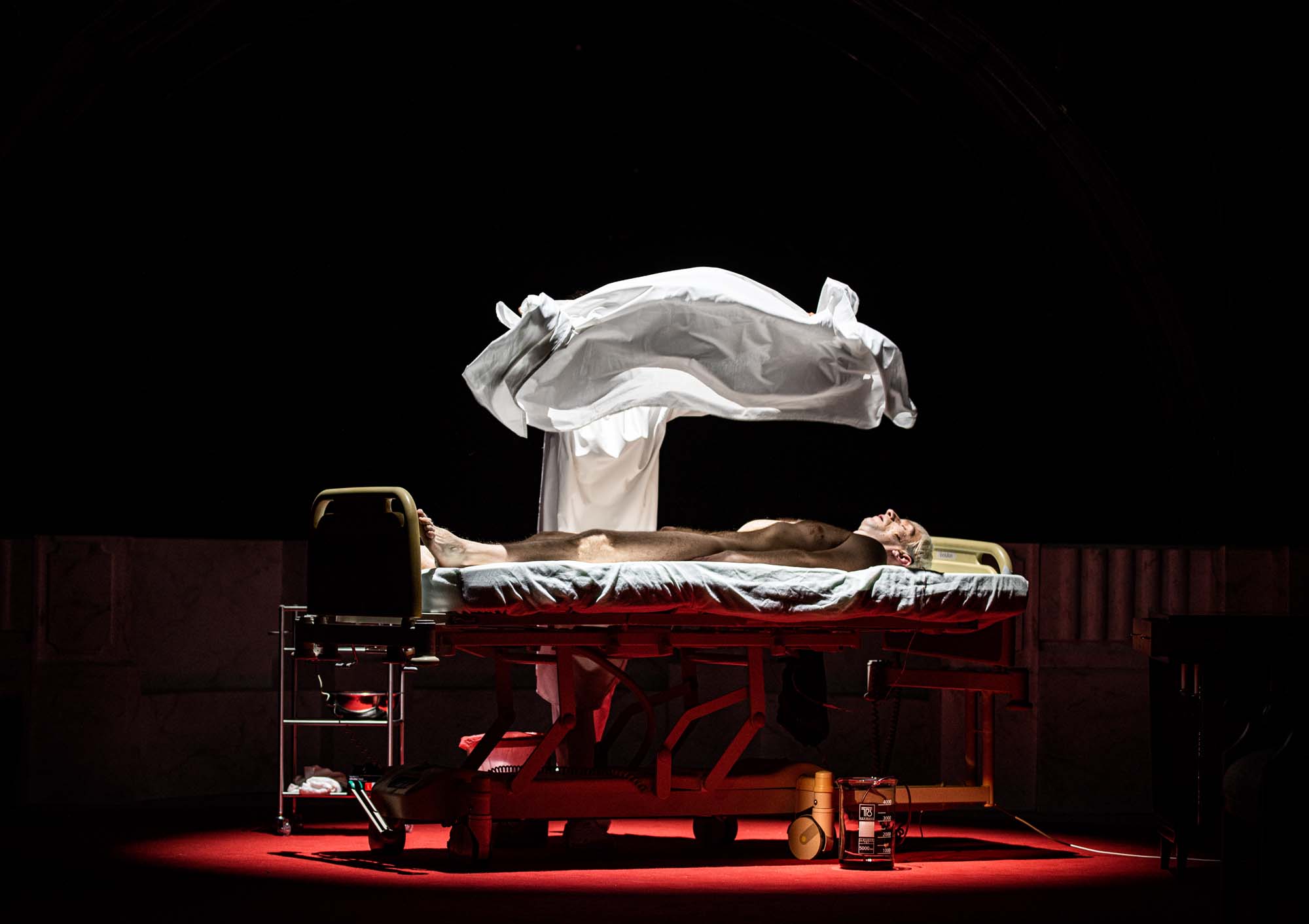
The performance is based on the biography, memories and diaries of those accompanying John Paul II in the final days of his life, including Stanisław Dziwisz and Mieczysław Mokrzycki, medical records, palliative analysis and the Ordo Exsequarium ceremony.
The inspiration behind the drama was, among others, Albert Serra’s film The Death of Louis XIV. On 2 April 2005 at 21:37, the Pope’s personal physician Renato Buzzonetti pronounced the death of John Paul II. All social and cultural life instantly stopped. Thousands of people took to the streets, cars and public transport halted, fans paused their league games. The most important words of those days were “Santo Subito!“ (“Saint immediately!“).
“We want to revisit the last moments of Karol Wojtyła’s life and ask the question: are we all equal in the face of death and disease? Where is the boundary in showing disease and suffering? And what does this boundary become when all that is private becomes public?,” said the director of the show, Jakub Skrzywanek. “These questions are important especially in a society that is yet to come to terms with the death of John Paul II – perhaps the last God on Earth. The performance is intended for people aged over 16 years.
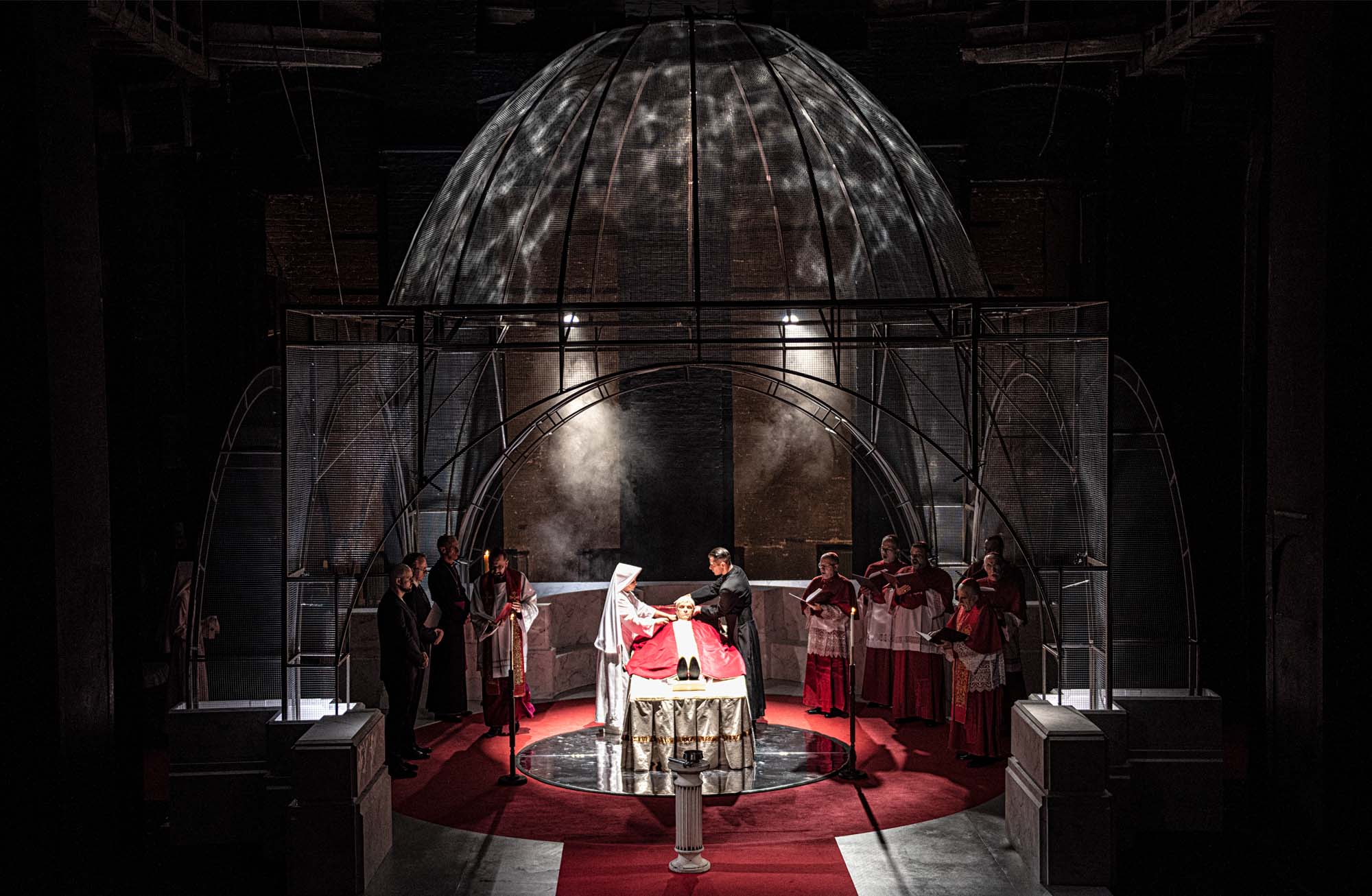
direction, script and dramaturgy: Jakub Skrzywanek
dramaturgy: Paweł Dobrowolski
music: Karol Nepelski
stage design and light design: Agata Skwarczyńska
costumes: Paula Grocholska
choreography: Agnieszka Kryst
video: Rafał Paradowski, Luba Gorobiuk
medical consultant: dr Michał Błoch
nursing consultations: Aldona Marciniak
language consultations and translation into Italian: Magdalena Krupa, Nicola Marra
Latin consultations: Magdalena Chrzuszcz
makeup: Jola Łobacz, Magdalena Chrzuszcz
assistant composer: Oktawia Pączkowska
stage managers: Magdalena Matusewicz, Karol Gromek
legal advice: kancelaria DotLaw / DotLaw law firm
cast: Michał Kaleta, Mariusz Adamski, Piotr Kazimierczak, Barbara Krasinska, Monika Roszko, Andrzej Szubski, Piotr Dąbrowski, Alan Al Murtaha, Kornelia Trawkowska, Bogdan Żyłkowski, Jakub Papuga
chórzyści / choristers: Piotr Bróździak, Michał Mierzejewski, Witold Nowak, Marian Panek, Robert premiere: 5 February 2022
running time: 1 hour 50 minutes
Jakub Skrzywanek
Born 1992 in Wrocław, a director, author and creator of performative installations, since January 2022 a creative director at Teatr Współczesny in Szczecin. A graduate of the Stanisław Wyspiański Academy of Theatre Arts in Kraków, Polish language studies at the Wrocław University and the DOKPRO course at the Wajda School. He often addresses topical issues of public debate while attempting to challenge established myths and overturn social taboos.

His performances take the form of epic spectacles combining literature, film, documentary theatre and archival work. Since his award-winning debut (Cynkowi chłopcy at Teatr Dramatyczny in Wałbrzych) hailed as one of the best debuts of 2015/16, his subsequent performances have been constantly featured at Polish festivals and have made it to the top of ranks prepared by major Polish critics. He works with a number of Polish theatres, including Teatr Powszechny in Warsaw, Teatr Polski in Poznań, Teatr Współczesny in Szczecin and the unique Teatr 21, whose professional acting troupe is made up of people with disabilities.
His latest shows are: Gargantua i Pantagruel at Wilam Horzyca Theatre in Toruń and Jan Kochanowski Theatre in Opole (2020), Śmierć Jana Pawła II at Teatr Polski in Poznań (2022) and Spartakus. Miłość w czasach zarazy at Teatr Współczesny in Szczecin (2022). Apart from theatre houses, he delivers performative social installations that critically comment upon reality. As part of the action Pomniki Polskie, he has unveiled the plaque commemorating Szmul Wasersztajn and his testimony to the Jews murdered by Polish civilians. In Kraków, he has also prepared a performative show that lasted several days, the finale of which was the “Monument to the citizens of Kraków,“ which eventually turned into a devastated wall full of offensive and xenophobic slogans.
He is the author of Pogrom alfonsów, Warszawa 1905 and To my jesteśmy przyszłością!, in which he seeks to explore violence, ethnic and national identity issues and the coming of age based on archives and documentary work. Both texts have been acknowledged during the Gdynia Drama Award competition, making it to the semi finals along with other pieces. He is a two-time scholarship holder of the Mayor of the City of Wrocław and the Laboratory of New Theatre of Teatr Nowy in Kraków, as part of which he prepared the performance To my jesteśmy przyszłością!
“Maszyna” – dir. Jagoda Szelc – Teatr Polski im. Hieronima Konieczki in Bydgoszcz
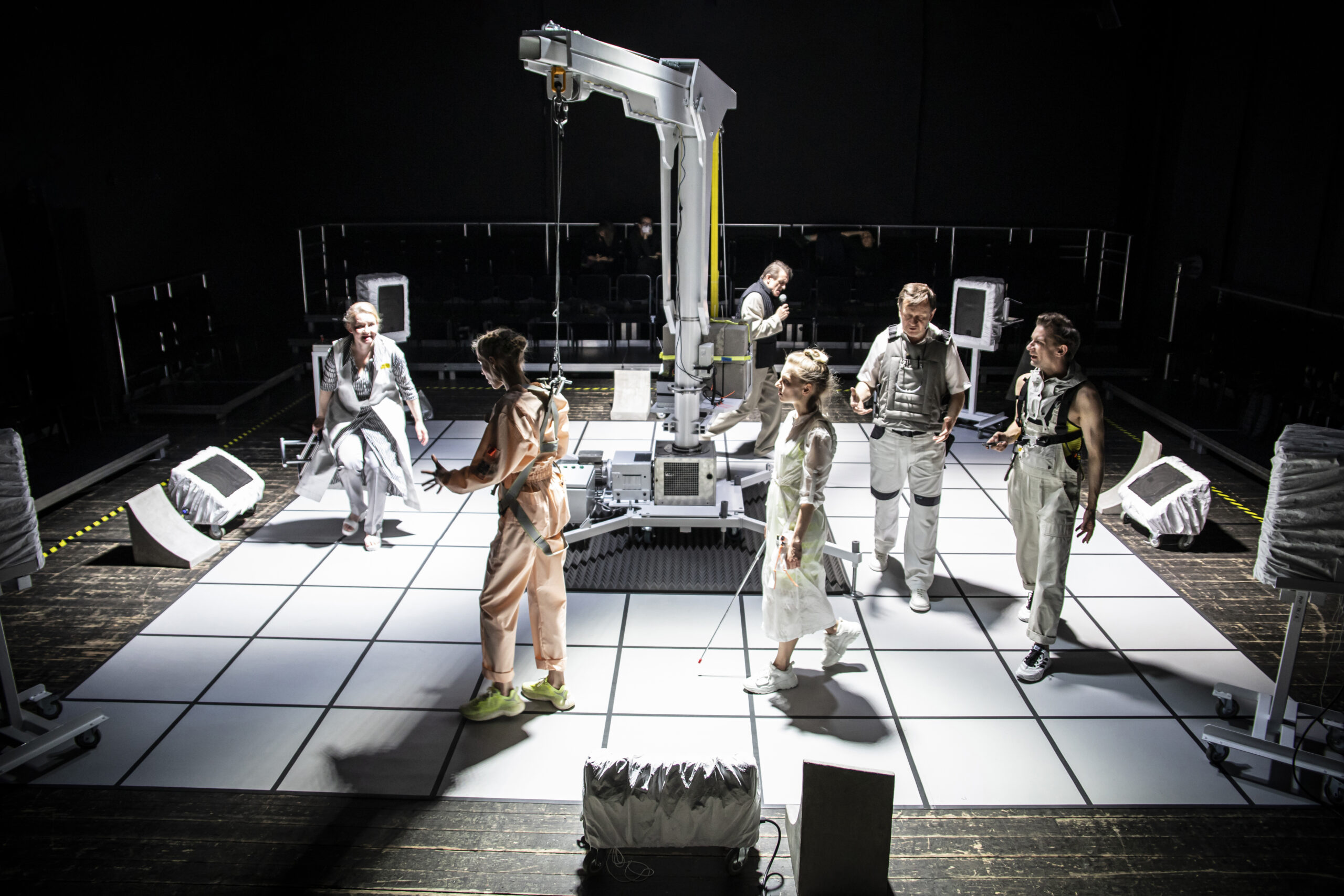
The machine has worked for a long time. Every day. Systemically. You don’t need to start or maintain it. It works perfectly even if broken. One can admire it. One can play it, or just ignore its operation. Why do you keep listening to it with your mouth open then?
The machine irradiates people with sound. It has recently been found that if you are exposed to a specific sound wavelength and vibration of that wave for a certain period of time, behavioral modifications occur and your thoughts are colonized. This process consists in training, nurturing proper reflexes, trimming, giving you consent, judging, as well as repetitions and omissions. It is good to stay low key to reduce the risk of disturbances. Bonding doesn’t support this process, either. One’s effective training to play specific social roles gives confidence that the social and economic order will remain intact and that you will duly fulfil your tasks.
The show Maszyna depicts the tiniest processes of longeing of our thoughts, ranging from tenderness to torture. These processes work in line with specific procedures, with their temperature and direction changing based on gender, age, social and economic class, and most importantly on what you hear. In each installment, we experience only a fragment of the Machine’s capabilities.
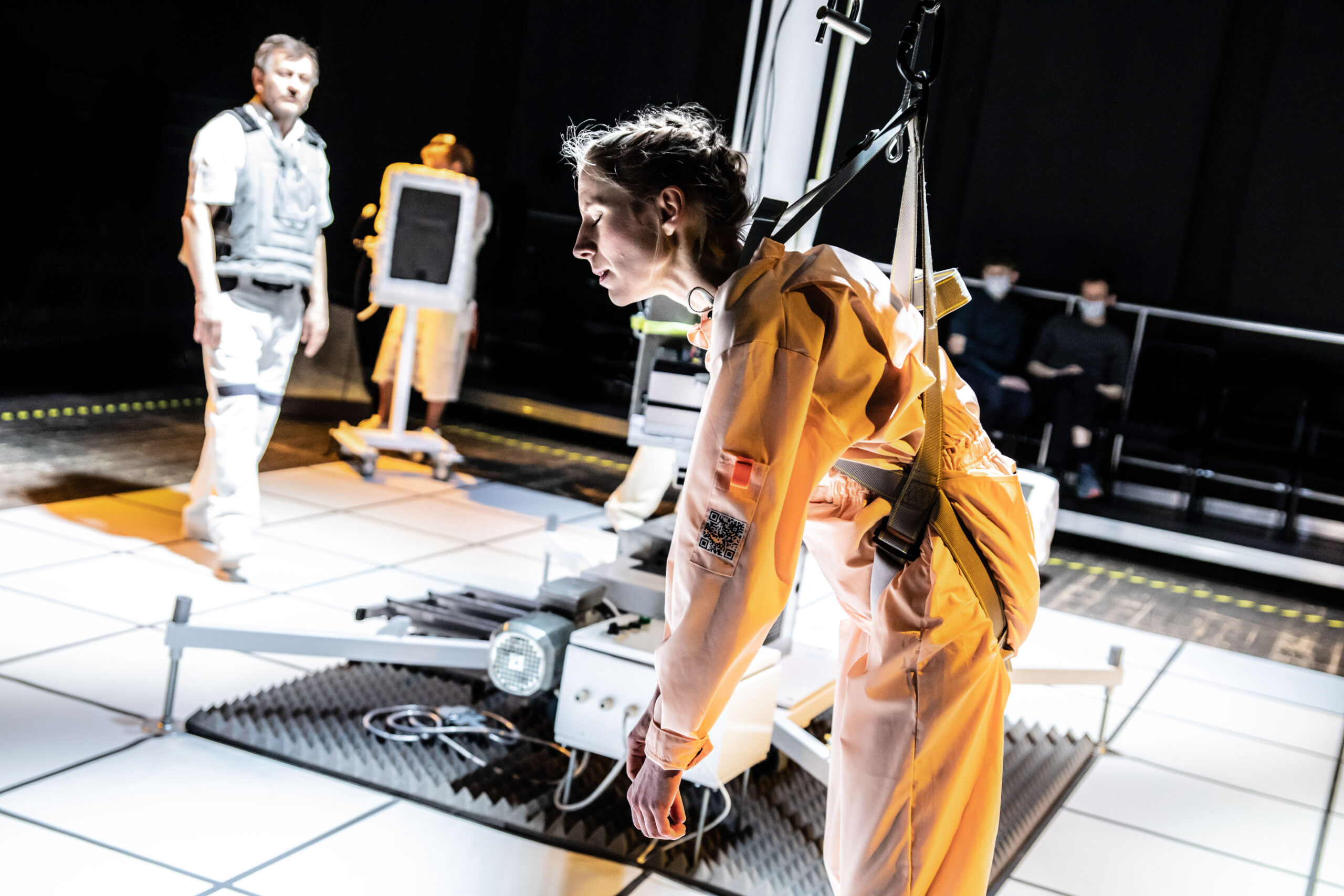
direction: Jagoda Szelc
dramaturgy: Marta Keil
script: Jagoda Szelc, Marta Keil in cooperation with actors
light and visuals: Przemysław Brynkiewicz
stage design: Natalia Giza
costumes: Maja Skrzypek
music: Teonika Rożynek
choreographic consultation: Agnieszka Kryst
video editing: Anna Garncarczyk
assistant director / inspicjent / stage manager: Adam Pakieła
make-up: Adriana Klemenska, Michał Boroń
cast: Sara Celler-Jezierska, Michalina Rodak, Małgorzata Trofimiuk, Mirosław Guzowski, Damian Kwiatkowski, Jerzy Pożarowski / Jakub Ulewicz
special thanks to: InSzPer, Jakub Momro, Karolina Grzywnowicz
premiere: 29 May 2021
running time: 75 minutes
Jagoda Szelc
graduated in graphics at the Academy of Fine Arts in Wrocław and from the Faculty of Film and Television Directing of the National Film School in Łódź. Before she came to direct her debut movie Tower: A Bright Day (2017), she had made 10 short feature and documentary shorts.
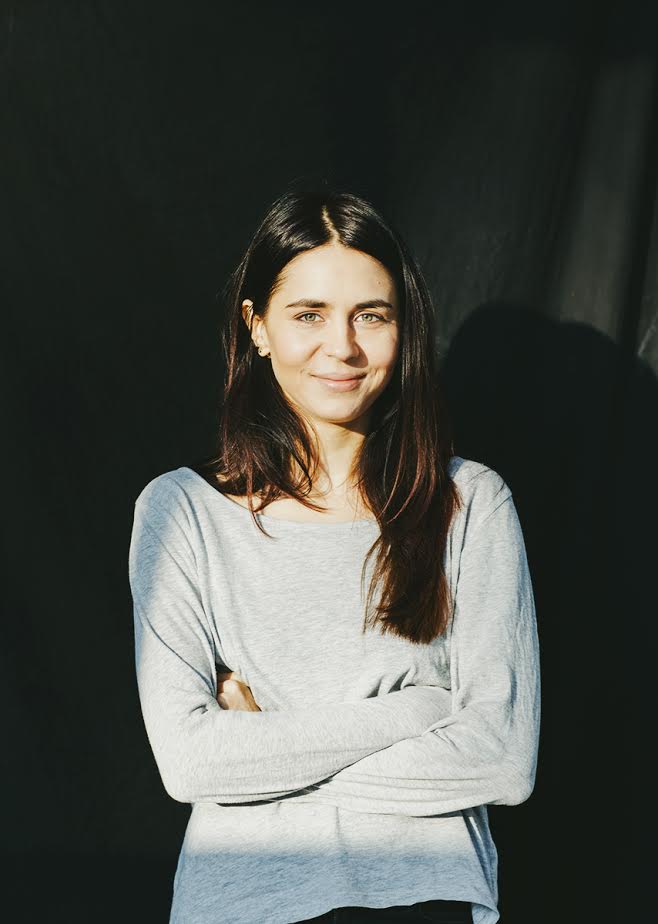
Her films have been shown at many festivals, among others: Karlovy Vary IFF, Hot Docs, Cannes Court Métrage, New Horizons and Brooklyn Film Festival. The film Such a Landscape won the main prize for student film – the Golden Tadpole at Camerimage 2013. For the film Tower: A Bright Day, she was awarded best directorial debut and best screenplay prizes at the Polish Film Festival in Gdynia 2017. It was also included in the prestigious section of the Forum of the Berlin IFF 2018.
In 2018, Jagoda Szelc was awarded the Polityka Passport award in the film category. The same year, she finished her second full-length film Monument, for which she received the Special Award at the Polish Film Festival in Gdynia. As a theatre director, she made her debut with The Machine at Teatr Polski in Bydgoszcz in May 2021. Uśmiechnięty at the Nowy Teatr in Warsaw is her second show ever. Its premiere took place in June this year.
“Der Szturem. Cwiszyn / Burza. Pomiędzy” – dir. Damian Josef Neć – The Ester Rachel and Ida Kaminska Jewish Theatre
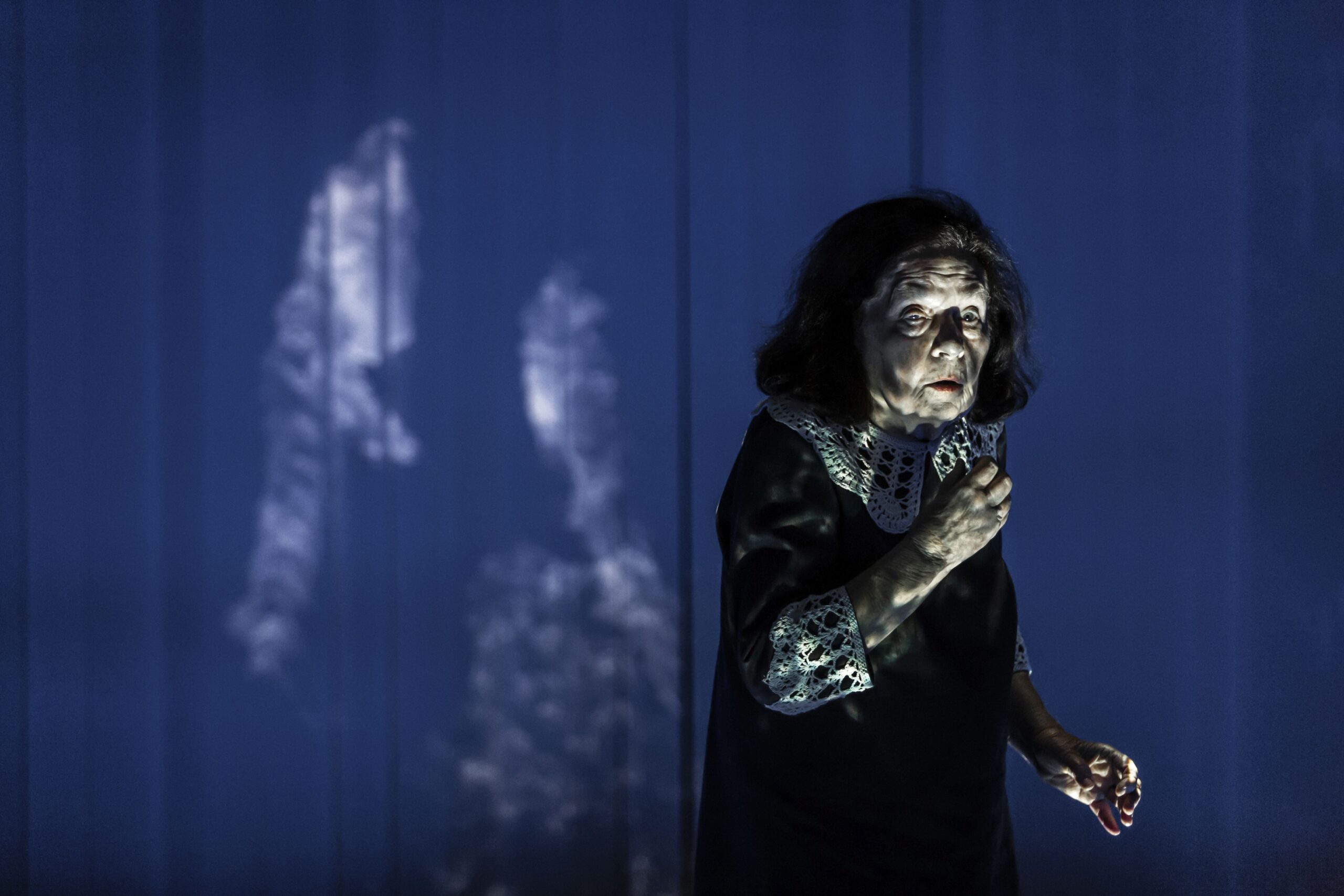
The premiere of The Tempest in Yiddish took place in Łódź in 1938 at the Folks Un Jungt Theater, and was staged for Warsaw audiences in 1939. It was hailed by both Jewish and Polish critics as a success story for Jewish theatre in Poland. A success that would fill audiences with optimism and faith in a common Polish-Jewish world, despite the increasingly anti-Semitic acts taking place offstage and the fascists growing in strength. A symbol of the new barbarism in Schiller’s staging, Caliban’s words: “when you burn down his books, he will lose all his power” sound like a harbinger of the Pogrom today. After the horrors of World War II and the Holocaust, the idea of staging Shakespeare in Yiddish was never revisited in Poland.
In addition to Shakespeare’s The Tempest in Yosef Goldberg’s Yiddish translation, the performance will feature excerpts from the Ringelblum Archive, as well as the Book of Lamentations and the Song of Songs. Today, 82 years after the Lódź premiere of The Tempest, we are curious how it will resonate in Poland divided by internal strife. Will the Yiddish language become a meta warning against the demons of history reoccurring?
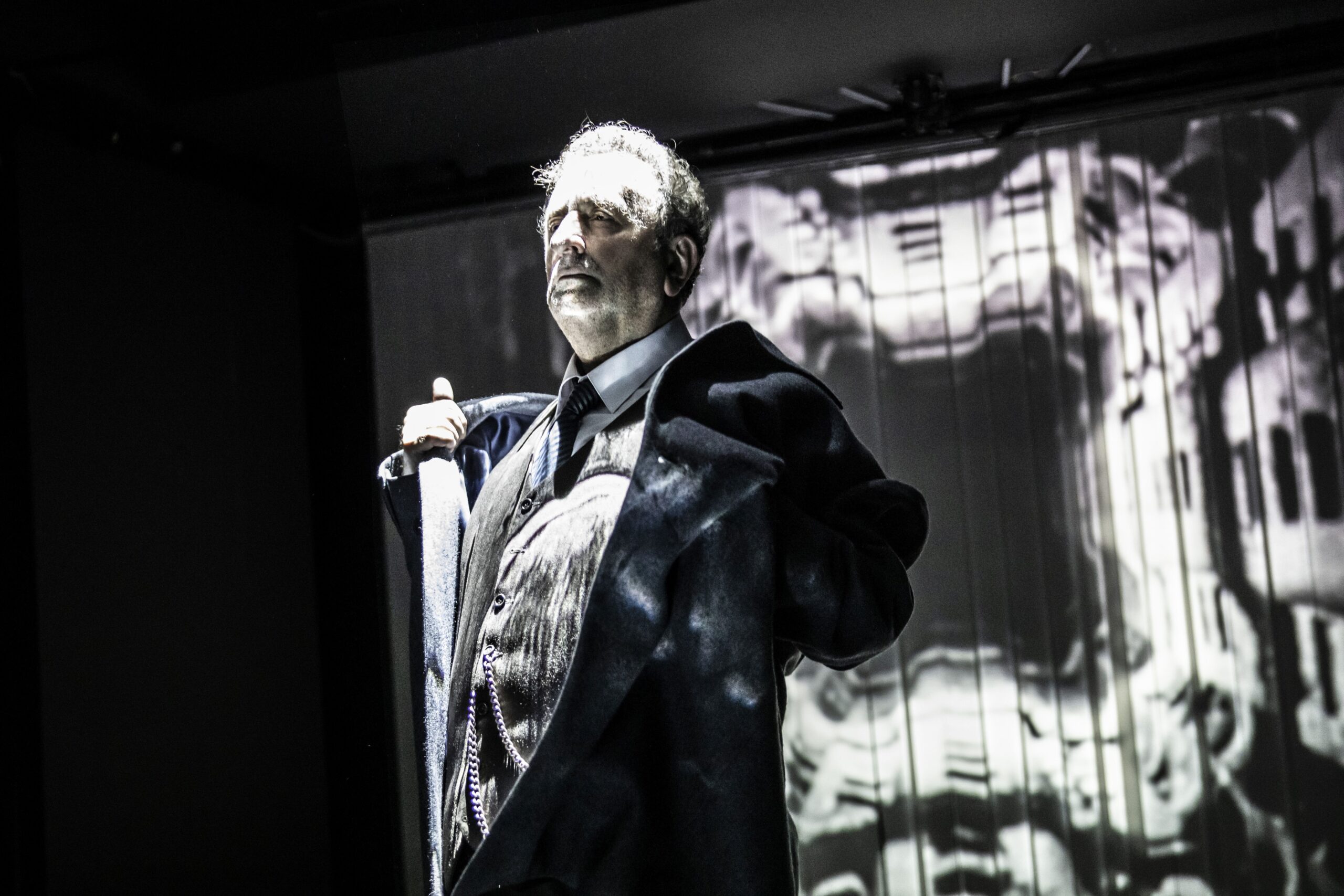
direction, script and dramaturgy: Damian Josef Neć
stage design, costumes, visuals: Maciej Czuchryta, Marta Wieczorek
music: Sławomir Kupczak
Yiddish script adaptation and transliteration: Aleksandra Król
cast: Henryk Rajfer, Jerzy Walczak, Wanda Siemaszko, Barbara Szeliga, Joanna Przybyłowska, Marek Węglarski, Marcin Błaszak
premiere: 3 October 2020
running time: 60 minutes
Damian Josef Neć
Director, playwright. He graduated from the Directing Department of the Aleksander Zelwerowicz National Academy of Dramatic Art in Warsaw and also studied at the Department of Judaic Studies of the Jagiellonian University. He is the creator of video art works – his #HaAdam and Number were presented at the exhibitions Young Jewish Art (Młoda Sztuka Żydowska) and Judaism in Art (Judaizm w Sztuce).
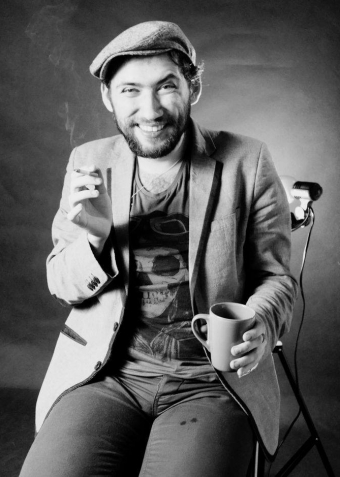
In 2016, he made a series of performative readings of Chamesh Megillot, using its contemporary
Polish translation, which he co-authored, at the Teatr Polski im. Arnolda Szyfmana in Warsaw. He was an assistant director in productions directed by Maja Kleczewska Golem and Jak wam się podoba. In 2017, his performance Chicas PL was presented during the Sibiu International Theatre Festival in Romania, and in 2018 the performance Hagada na Polskę was staged during the Miasto Szczęśliwe Festival at Teatr im. Zygmunta Hüebnera in Warsaw. The director’s performances were also shown twice at the International Shakespeare Festival in Gdańsk, the International Contact Festival in Toruń and the Yidish Teater Internacjonaliszer Festival in Bucharest.
His recent performances are: Aktorzy prowincjonalni at Teatr im. Wilama Horzycy in Toruń (2019), Der Szturem.Cwiszyn / Burza. Pomiędzy at the Jewish Theatre in Warsaw (2020) and Biesy at the Teatr im. Wilama Horzycy in Toruń (2021). He is an author of the script for the performance Ulisses directed by Maja Kleczewska, which premiered in June 2022 at Teatr Polski in Poznań.
